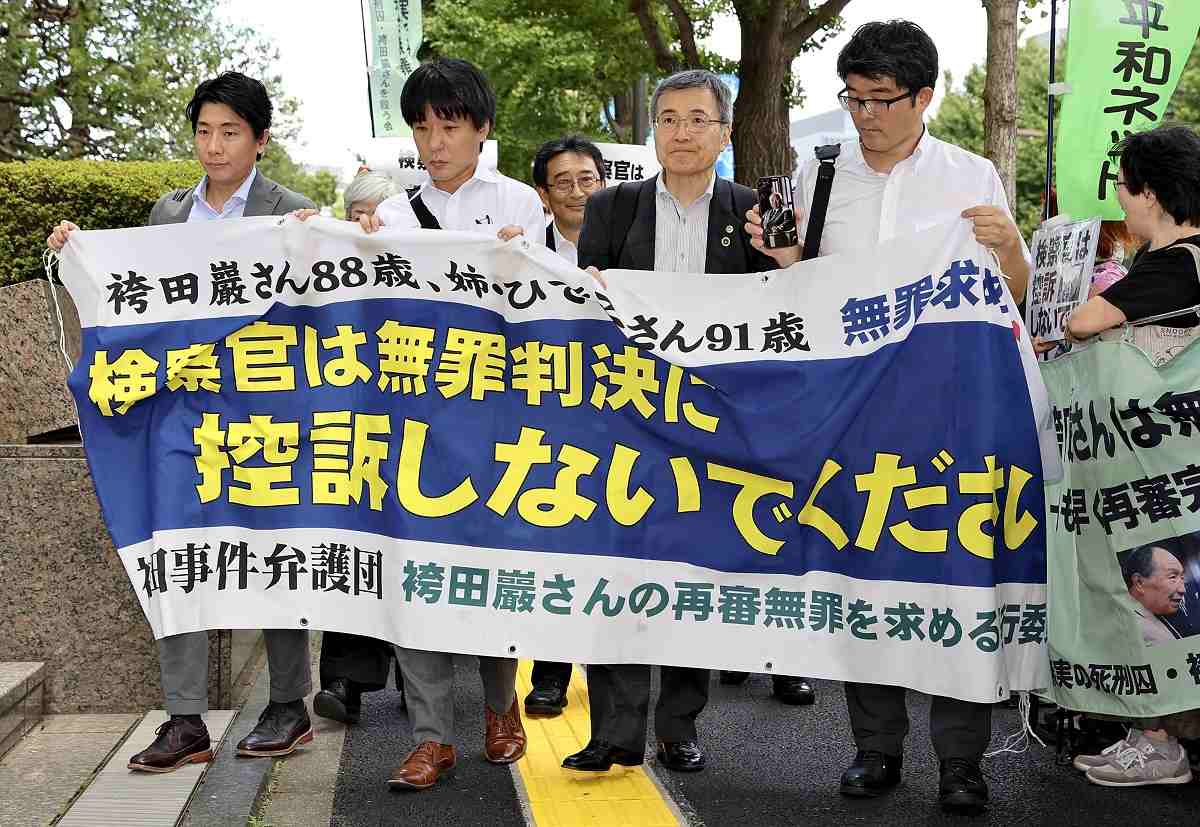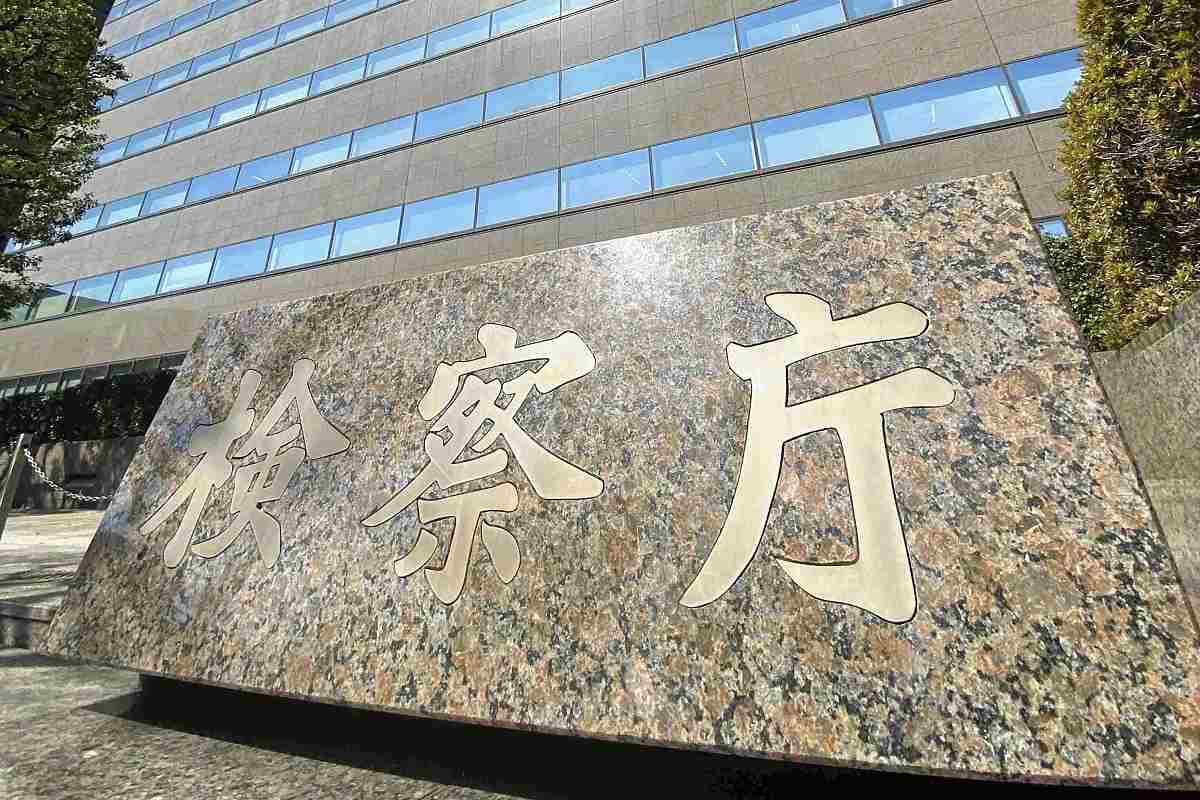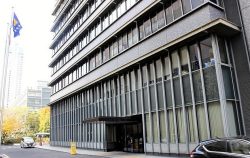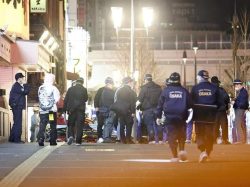Japan Prosecutors Opt Not to Appeal Hakamata’s Acquittal; Death Penalty Case Marked by Controversial Evidence

Members of Iwao Hakamata’s defense team head to the Tokyo High Public Prosecutors Office to request that it not appeal the ruling that acquitted him on Monday in Tokyo.
17:06 JST, October 9, 2024
It was a tough decision for the prosecution to give up on appealing the Shizuoka District Court ruling acquitting Iwao Hakamata over a 1966 murder and robbery.
A statement by the prosecutor general, released by the Supreme Public Prosecutors Office on Tuesday, expressed dissatisfaction with the court’s finding that the evidence presented by prosecutors was fabricated. Even so, prosecutors decided to “withdraw” from the case, in serious consideration of the fact that over 40 years have passed since a retrial was first requested.
“Prosecutors gave profound consideration to the fact that Mr. Hakamata has been placed in an unstable situation for a long time,” the statement said.
Signs of a likely withdrawal by the prosecution had been seen. Public opinion was leaning toward acquittal for the elderly Hakamata, 88, who had spent 48 years in custody after his arrest.
On Monday, the day before prosecutors made the announcement that they would not appeal, a prosecutor in charge told the defense team, which had requested that higher public prosecutors offices abandon the appeal, “We will also take Hakamata’s age and health condition into consideration” in making a decision.
Prosecutor General Naomi Unemoto, who assumed the position in July, was the Tokyo High Public Prosecutors Office’s superintending prosecutor when the Tokyo High Court decided to grant a retrial in March last year.
According to those involved, when the high court ruling cited “the possibility of fabricated evidence,” which prompted calls from prosecutors to make a special appeal, Unemoto expressed her intention not to make the appeal by saying, “I can’t see any reasons for it, such as a violation of the Constitution.” The then prosecutor general is said to have agreed with her opinion.
The retrial ruling went further than the high court’s decision and determined that the evidence was fabricated. This was met with strong opposition among prosecutors.
On the other hand, a senior prosecutor said that the ruling was not “wholly exonerating,” as it rejected many of the defense’s arguments, including that “the crime was committed by multiple people.” The court also acknowledged the existence of “evidence consistent with” Hakamata’s guilt, albeit limited.
With the appeal deadline approaching on Thursday, Unemoto was faced with making a decision as the head of the prosecution. With no certainty that the appeal would be successful, she ultimately decided that it would not be appropriate to continue the trial and decided to abandon it.
Lawyer Tetsuo Ito, who served as the Supreme Public Prosecutors Office’s deputy prosecutor general, said, “Although they could not accept the ruling that was based on sloppy fact-finding, the prosecutors probably had no choice but to make this tough decision as their work depends on the trust of the people.”
Dissatisfaction

The prosecutors’ building where the Supreme Public Prosecutors Office among other offices are housed
Instead of appealing the verdict, the prosecutors took the unusual step of expressing their dissatisfaction in the top-level statement.
The evidence at issue was five items of clothing that were deemed to be the clothes worn by the culprit at the time of the crime. They were found in a tank of miso, where they were said to have been hidden for more than a year. The district court determined that the color of bloodstains on the clothing would not be red if they were pickled in miso for that long.
Unemoto’s statement criticized this determination by saying, “The court had not sufficiently considered the opinions of many scientists.” As for the court’s finding that the evidence was fabricated, the statement fought back by saying, “No specific evidence or grounds had been presented.”
Tokyo High Public Prosecutors Office Deputy Chief Prosecutor Eiji Ito said, “I apologize to the [victims’] family,” citing facts that the statute of limitations had already expired and that it was not possible to expect the truth to be revealed.
At the same time, he stressed: “We do not want to give the impression that we did not appeal because we accepted the ruling.
“We do not accept the court determination that the evidence was fabricated.”
Seijo University Prof. Makoto Ibusuki, who specializes in the retrial system, said, “I would like to commend the fact that the top prosecutor has apologized and presented her stance of not evading responsibility.”
Top Articles in Society
-

Man Infected with Measles Reportedly Dined at Restaurant in Tokyo Station
-

Man Infected with Measles May Have Come in Contact with Many People in Tokyo, Went to Store, Restaurant Around When Symptoms Emerged
-

Woman with Measles Visited Hospital in Tokyo Multiple Times Before Being Diagnosed with Disease
-

Australian Woman Dies After Mishap on Ski Lift in Nagano Prefecture
-

Foreign Snowboarder in Serious Condition After Hanging in Midair from Chairlift in Nagano Prefecture
JN ACCESS RANKING
-

Japan PM Takaichi’s Cabinet Resigns en Masse
-

Japan Institute to Use Domestic Commercial Optical Lattice Clock to Set Japan Standard Time
-

Israeli Ambassador to Japan Speaks about Japan’s Role in the Reconstruction of Gaza
-

Man Infected with Measles Reportedly Dined at Restaurant in Tokyo Station
-

Videos Plagiarized, Reposted with False Subtitles Claiming ‘Ryukyu Belongs to China’; Anti-China False Information Also Posted in Japan





















